

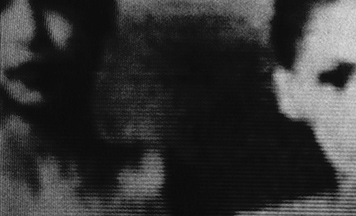
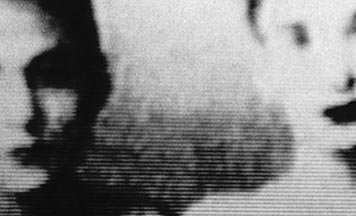
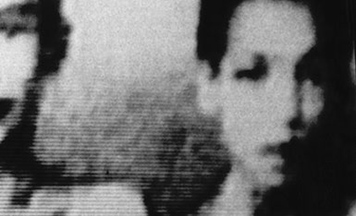
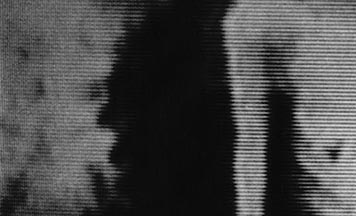
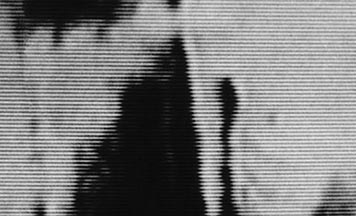
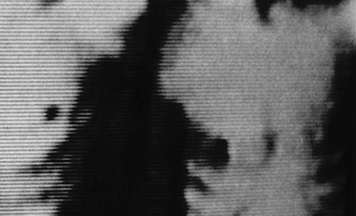
Clarke Blacker was the guitarist in Stick Men With Ray Guns, a legendary punk rock group from Texas. They were fronted by the late Bobby Soxx, one of the wildest musicians in the underground rock. Their last show was in June 1988 however in 2000, Clarke Blacker re-released 16 of their recordings on an album entitled Some People Deserve to Suffer.
Punk Globe: You played in Bag of Wire before you formed Stick Men with Ray Guns, what can you tell me about that group?
Clarke Blacker: As my previous band, The Nervebreakers was disintegrating, lead guitarist Mike Haskins and Bob Childress (the bass player who had replaced me when I left a couple of years before) finally bailed out and together we started a new band, Bag of Wire (BOW). BOW was a strange amalgam of rock, blues, rockabilly, ska, and anything else that interested us. Then we mixed some Captain Beefheart and some Roky Erickson with it for just a bit more spice. Mixing a bunch of different styles in a blender approach has long been a favorite tactic of mine.
BOW was started as a rock band that had no philosophy to push. We took our name from the Jamaican slang term for "betrayer" after the man who had turned in Marcus Garvey to the authorities and later became a street person wandering the streets of Kingston picking up bit of wire. We thought it was appropriate after all, we were breaking up the longest-lived lineup of the Nervebreakers, Dallas' premier punk rock band.
We all liked guitar oriented rock, we liked a lot of different kinds of things, and we didn't think there was anything incompatible about any of those different musical interests all in the same band. We didn't see any reason why the punks shouldn't like it too. We had fun, we played loud, and were very popular with the girls. With three of the five of us going through divorces BOW didn't last very long.
Punk Globe: What was the wildest concert for SMWRG that you remember?
Clarke Blacker: That really depends on what you mean by favorite. Stick Men With Ray Guns (SMWRG) was not your normal band. We discovered quite early on that we were more interested in amusing ourselves than being popular.
Essentially, we thought Bobby was very funny and so we would just egg him on. Our shows had elements of chaos, not usually violence It was more of a general disorder, often in reverse proportion to the size of the club. The smaller the club, the more things tended to get nuts, and the more comfortable we were, the more unpredictable the show was.
However, if we were pissed off about something then things could get really weird very fast. He would taunt the audience, going on long rambling rants that could offend everyone.
There are two shows that stick out in my mind because I really enjoyed them. The first was at a house party in East Dallas. We had been asked to play at this gigantic party, I have no idea whose house it was but there seemed to be hundreds of people wandering around and there were a numebr of bands playing.
We came really late after another show. Finally, around 3 am or so I was suffering through some 3 piece keyboard band that just wouldn't stop playing. I eventually got so pissed off that when we finally started playing I decided to screw up my sound so bad by using my Fender Concert amp's tremolo and two separate echo units all (at the same time) that no one could tell what I was playing at all. Especially SMWRG. I was going to punish anyone who could hear me. That was fun, but only for me.
The other show that sticks in my mind was at the Ritz Theater in Austin, Texas in the mid-80s. The Ritz is a very famous old converted movie theater. The club was having electrical problems and the power kept shutting down.
After the third or fourth shutdown I was bored and leaning against the wall at the side of the stage not paying attention when the audience started hollering and pointing at the center of the stage. Bobby had gotten bored too and so naturally he started poking around at the junk laying around the stage.
He had come up with a styrofoam plastic wig head. That's one of those bald heads that wigs sit on in stores or in peoples closets I guess. Anyways, he had stuck one of Scott's broken drumsticks into the base of the head. He then had pulled down his pants and stuffed the drumstick up his ass. I hadn't even noticed what he was up to, and before you knew it, there he was, pogoing around the stage with this wig head on a stick bouncing around out of his ass like an idiot. I could not stop laughing. The audience loved it. Eventually they got the power back on and we finished the show but I'll never forget that sight.
Punk Globe: Why do you think Bobby Soxx was so aggressive on stage?
Clarke Blacker: He really wasn't that aggressive in the violence sense. It was more that he mouthed off to anyone and everyone but, in the end, he made more fun of himself than of anyone else. His reputation is often misunderstood. Our shows were unpredictable but not really violent. Now Bobby was personally violent, but not in SMWRG.
Punk Globe: Tell me what do you think about the shock rock art in rock and roll (Bobby, Stiv Bators, GG Allin)?
Clarke Blacker: I don't really have much an opinion, I appreciate challenging the audience, but not just because you can. We did things we thought were funny.
I had seen a just little of the late Stiv Bators work and while I thought he was interesting, I wasn't a big fan of what he was doing. I didn't much like Lords of the New Church, a few songs but not the band's general approach.
I have a video of GG Allin that I've only watched once. I thought he was crappy. Just a lot of shock for shock's sake, lousy songs, and nothing original in the playing or sound. Anyone can wipe shit on himself and throw it at the audience. I'd much rather have monkeys throw their shit at me for that matter. Everything's better with a monkey. I live my life by that rule.
Punk Globe: Who deserve to suffer?
Clarke Blacker: I guess that I'd have to say everyone deserves to suffer. Privately, Scott and I talked a lot about SMWRG and exploring the irrationality of violence and hatred. We made fun of everything and everyone. No one was safe, nothing was sacred, especially ourselves.
Just look around you, the world is a cesspool. None of us are any better, no matter what we think. We all have hatred and murder inside of us and it doesn't take too much to let it out. It isn't something to be proud of. We aren't any better than the monkeys, they're better than us. At least they don't have religion.
SMWRG didn't advocate hate, we just didn't advocate anything. To us, everyone was a liar, including ourselves.
Unfortunately, when it came time to put out the CD, Scott had had somewhat of a change of heart and he refused to allow us to use the cover picture that he had taken years before for the cover. It was a closeup of a television image of a picture taken of four emaciated children in a Nazi concentration camp at the end of WWII. Scott didn't feel comfortable using that image any more. I wish he didn't feel that way but that was the way it was.
I guess he was afraid that people might get the wrong idea and think that we were making fun of the children's suffering. We weren't, we were just calling attention to the pain and suffering in the world. By the way, Scott also contributed the title of the CD.
Punk Globe: Thanks for the interview Clarke!
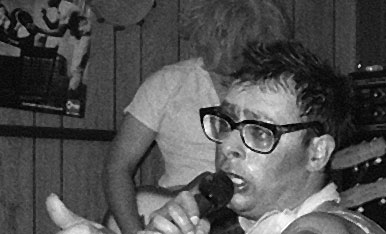
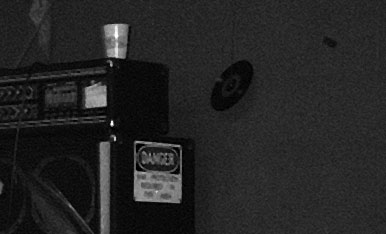
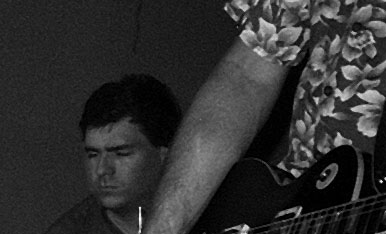
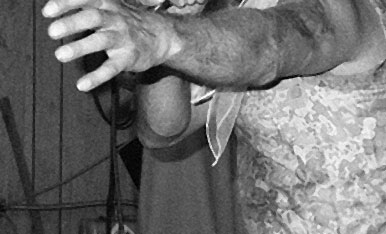
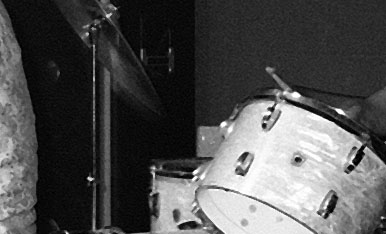
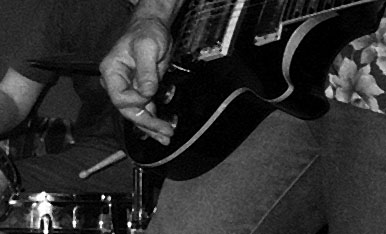
The Dallas Observer recently did a top ten list of the best Texas punk bands. They had Stick Men With Ray Guns — Bobby Soxx, Clarke Blacker, Bobby Beeman and Scott Elam — coming third behind the Dicks at two and Big Boys at number one. That's fair, I think, considering SMWRG never officially released anything during their time together. They do pop up on various compilation albums. There's an appearance on the 1987 collection A Texas Trip, two songs: Grave City and Kill the Innocent, and Christian Rat Attack features on the 1983 release Cottage Cheese from the Lips of Death. They also perform Two Fists on 1983's Live at the Hot Klub, recorded in the summer of 82, and Satan Baby is included in the series Tales from the Edge (vol 5 & 6). The main SMWRG offering is of course the Clarke Blacker-assembled Some People Deserve to Suffer, over a decade in the making and containing 23 tracks, which was released in 2002. Speaking for myself, I had to recalibrate my definition of “brutal” after hearing it for the first time.
Texas produced some great punk bands. Even if you're not a fan of acts like Big Boys, the Dicks, the Stains (MDC) and Jerry's Kids, you'll at least appreciate they were important bands. Lesser-known bands such as Vomit Pigs, Sharon Tates Baby, the Huns, the Hickoids, the Nervebreakers, Tex and the Saddletramps, Really Red, Buffalo Gals, the Hugh Beaumont Experience, Marching Plague, the Offenders, Toxic Shock and the Inserts were part of a thriving Texas music scene that rocked the big city punk clubs in the early 80s, in venues such as Raul's, Studio 29 and The Vault in Austin, the Twilight Room, Studio D, and the Hot Klub in Dallas, and various warehouses and house parties.
It was fantastic to be able to get this interview with Stick Men With Ray Gun guitarist Clarke Blacker so soon after the Gary Floyd interview, and completing a Texas three-strike with last years's interview with Toby Marsh (of the Motards and Open Casket). Texas has been somewhat overshadowed in the U.S punk annals, by New York and Los Angeles, DC and San Francisco, and hasn't always got the credit it deserves. Stick Men With Ray Guns were a monster of a band that produced some of the most savage and acerbic songs ever to be written. A privilege indeed, then, to have this little tete-a-tete with Clarke.
Friedaswhip: About the SMWRG song 1,000 Lives to Die, Vice wrote: “If you were to make a pie chart of all the brutal songs in human history, this song would be the big Pac Man eating the wedge that is every other brutal song combined”. You must have been very proud.
Clarke Blacker: It's funny. I don't remember ever seeing this article from Vice that you've quoted here. I enjoyed reading it immensely. I never really thought much about 1,000 Lives being especially brutal, except possibly musically. It really all depends upon what exactly the writer was responding to. If he wants brutal, then maybe he should have listened to Christian Rat Attack.
But you asked me about 1,000 Lives. Yes, I am honored to have someone say something like that about this, or any of our songs. This is one of a number of later SMWRG songs that were going in a direction that I really wanted to explore further. I was becoming more interested in a kind of musical minimalism and I was moving toward one or two chord compositions. I was completely uninterested in the hyperactive super fast punk sound of the day, I found it very boring. For me the super speed didn't give the audience a chance to connect with either the lyrics or even the presentation except in a very superficial way. Except for Black Flag and a few others, most bands all sounded the same to me.
I guess that I was looking to stretch out and to have room for the music to breathe, or rather, to breathe fire in the audiences' faces. I wanted 1,000 Lives to be hypnotic, but really, really loud and annoyingly hypnotic, not at all soothing. The real point of interest to me was the drone and stripping the song down to almost nothing. In point of fact, I was always pushing to make the sonic environment completely saturated with a big howling, grinding noise. I wanted it to be uncomfortable for the audience to be standing in front of SMWRG when we were playing.
When we put the CD together (Some People Deserve to Suffer) for Emperor Jones Records, Craig Stewart and I chose this and another track (Buttfuckers) from a live show that we played with the Butthole Surfers at the Theater Gallery in January 1987. The Soxx showed up terribly sick and his voice sounded simply awful. Later, after listening to the tapes, that hoarseness sounded perfect on 1,000 Lives and his crazed intro about his landlord, completely transformed Buttfuckers.
I don't remember which came first, the lyrics or the riff, but 1,000 Lives is essentially a two-chord song based around this vaguely eastern-sounding riff that I was playing. On 1,000 Lives I used a quick delay to give it the tinny, doubled quality against Bobby Beeman's bass roar. I knew the lyrics at one time, but I have repeatedly listened to this track (and a few others) and I simply cannot pick up more than a few words here and there.
Friedaswhip: The cover for Some People Deserve to Suffer is great
Clarke Blacker: The cover of the CD is a photograph that Scott had found somewhere and we had used it on an old poster. When we were working on the CD Scott refused to go along with using his original cover idea which was a photograph that he had taken of the TV screen during a documentary that showed four starving children in a German concentration camp during World War 2. He was afraid that people would misunderstand and think we were making fun of them or their plight, which we weren't. As a compromise, we agreed to use the other photo that you see here. I had contacted the original photographer and gotten permission to use that on the final cover. I still liked his original picture better and I may use it someday on another SMWRG project.
It is unfortunately a fact that some people made assumptions regarding our views on race and other things that simply weren't true. Years later, the wife of one of my closest friends took one look at the website and immediately thought that we were Nazis. She knew me very well and knew that it wasn't true but she really didn't know that much about the band either. The next day I put up the disclaimer on the home page of the website to prevent just such a misunderstanding. We weren't against any race or had any political axe to grind. We were against everything, including ourselves.
Friedaswhip: Your first band was Bag of Wire, but I have never found any recordings. What sort of sound did they have?
Clarke Blacker: It isn't exactly true that Bag of Wire was my first band. I had been playing in bands of various sorts since around 1968. I was doing a critical history of modern rock show (how pretentious does this sound) at a local radio station around 1975-76 and through the show met Mike Haskins. Mike was working in a local Peaches record store and we shared a lot of musical interests. One day he invited me over to see his band, The Nervebreakers perform in a local club. I was completely blown away by their performance. Like many people, I had become disillusioned with the general direction of rock music in the 70s and had become very interested in the European jazz/art rock of bands like Gong, Nucleus, and others. I had begun to ignore mainstream rock entirely. The Nervebreakers show made me remember just why I liked rock in the first place. They were brash, loud, and took their influences from bands like The Kinks, The Troggs, and even The Supremes.
I went back the next week to record them for my radio show. Pierre, their bass player left a few weeks later and I offered to sit in on bass (not my instrument) and eventually was absorbed into the band. I played with them for about a year but despite my deep musical attraction, I never really fit in well with the band personally.
After playing the Dallas Sex Pistols show in January 1978 I left the band. I would remain close to lead guitarist Mike Haskins and acted as an on again, off again manager and general confidant. I was always very enthusiastic about the band and remain so to this day. I think that the writing team of Mike Haskins and Thom Edwards was unequaled and guitarist Barry Kooda writes some of the best power pop songs I have ever heard.
So what is the point of this? In the fall of 1980, during the recording of their first album with producer Phil York, there were serious tensions building in the Nervebreakers about the mix. Specifically there was the Mike Haskins mix and the Barry Kooda mix, and neither liked the other's approach. It ended with Mike leaving the band and then he and I decided to do something different. Along with Nervebreaker bassist Bob Childress, ex-Vomit Pigs drummer Russell Fleming, Mike and I set about starting a new band that would eventually become Bag of Wire (BOW). We discussed a number of lead singers and decided that we would ask someone we thought was interesting rather than someone we already knew could sing. Mike briefly considered Bobby Soxx but he was afraid Bobby was too unstable and would be too dangerous to work with. He then suggest Curtis Hawkins who ran a local collector record shop, Stacks O' Tracks. Curtis was perfect. He was the antithesis of a punk singer, he was a huge, burly guy with lots of interesting musical ideas. He suggested the name if I remember correctly. It is a Jamaican slang term meaning betrayer. Apparently the man who turned Marcus Garvey in to the authorities eventually went crazy and spent the remainder of his life wandering the streets of Kingston picking up bits of wire and putting them into a bag he carried. Betrayer, we thought it was appropriate.
BOW was my favorite kind of band. It was as if you put everything that you had ever heard and liked into a blender and turned it up on high. We played rockabilly, ska, blues, etc. We turned country songs into ska songs and ska songs into rockabilly songs. We played Roky Erickson songs, Captain Beefheart songs and Leslie Gore songs. I loved it. I was playing second guitar to Mike, one of the best guitarists I've ever known. BOW created a brief big splash in Dallas, the dancers liked us, the girls liked us, the clubs liked us. We weren't easy to categorize but everyone had a lot of fun. Unfortunately three of the five members going through divorces and Mike was burned out playing with another guitarist for so many years, I was eventually squeezed out. The band died a few months later. There are a few poor recordings of us live around but nothing official was ever released.
Friedaswhip: Would you say the Pistols' shows (at the Longhorn Ballroom) in Dallas and Randy's Rodeo in San Antonio kickstarted the Texas scene? Or is that giving Rotten and the lads too much credit?
Clarke Blacker: In all fairness, I wouldn't give them any credit at all. Their show made very little impact overall. Things were already starting to move pretty fast in the year (1977) before they got to Texas in January 1978. We (Nervebreakers) had already opened for the Ramones in Dallas and that had gone very well. Bands like the Toys and the Nervebreakers were the real drivers of the scene early on in Dallas. Their beginnings can probably be traced back as far as 1975 in various incarnations. The Toys were an odd kind of pop-rock band before there was anything like new wave. They would play different often older pop songs such as the Beatles' Bad Boy with a kind of edge and sense of fashion that was quite unlike anything else at the time. They were very interesting at a time when not much was interesting. They shared rehearsal space with the Nervebreakers and we would often play shows together. These two bands really set the tone and laid the groundwork for what was to follow.
The Nervebreakers had taken their name from a line in the Troggs song “I Can't Control Myself” and their sound owed a lot to them. I think that when I first joined we had about five Troggs songs in our repertoire. They weren't really punk although there was nothing else to call them. They shared qualities with the New York Dolls, especially with the dual guitars, but they weren't Glam either. It was a different kind edgy than that. They were really a band that just liked guitar-based rock, especially that of the 1960s and had managed to give it an entirely new feel without sounding like an oldies band.
At the first show I played with them, our sound man Colin measured us at 130 decibels at 80 feet from the stage. We were really loud! Nervebreakers laid the groundwork for everything in Texas. They were always the biggest dog on the block. Nervebreakers plugged along for years, just missing getting signed in the first wave of record contracts in 1978. For many years the record companies were only interested in you if you came from New York or LA, Texas was considered a backwater. When Mercury records came to see us with the Sex Pistols they were disappointed that we didn't sound like the 13th Floor Elevators. I guess they were too lazy to actually listen to the demos, preferring to take a road trip instead. It is unfortunate that the Nervebreakers have never received the recognition that they deserved. They still play shows around Texas from time to time with the same lineup as when I left the band.
Friedaswhip: Were you listening to the UK punk bands in the late 70s, like the Damned and the Clash, or the more arty bands like Wire and the Slits?
Clarke Blacker: In fact, BOW had played a Damned song, called Red Lips or something like that. I was a huge fan of the Clash, maybe the last truly great band. Each of us in SMWRG had wildly varying musical interests. Scott was very much into Wire, New Order and Gang of Four. I liked PIL, the Clash, and I was starting to be interested in the US Los Angeles punk scene revolving around Black Flag, Circle Jerks, and Fear. I was also listening to Dave Edmunds and Gang of Four at drummer Scott Elam's insistence. Bobby Beeman was interested in a lot of the speed metal when he first joined and played things like Megadeath for me. I didn't like them. The Soxx listened to everything.
Friedaswhip: Some really great punk bands came out of Texas. New York, Los Angeles and DC get most of the attention but for me Texas and San Francisco were equally as good, if not better.
Clarke Blacker: My wife and I saw a long documentary a couple of years ago about the punk scene in Chicago, a huge music town. I was surprised that every band they talked about and showed live footage of was really nothing that you would ever remember or would want to listen to twice. It made me realize just how unusual the Texas scene really was. More different kinds of bands came out of Texas in the late 70s and early 80s than any other single place in the US that I can think of. I don't mean they were successful, because with the exception of the Butthole Surfers they weren't. I just mean that Texas bands had an originality that was missing in other places.
Friedaswhip: What make of guitar did you play in the bands you were in? Did you have a preference?
Clarke Blacker: I used primarily only two guitars with a third used only for one specific song. I started out using the white 1961 Les Paul Custom (SG) that I had owned since 1970. I loved that guitar but in 1984 after suffering some minor damage at a show in Houston I went right out and bought a used black 1976 Les Paul Standard and continued to use that for most shows. I wanted a guitar that I didn't care about and that I could replace any time if it got damaged. I liked the black Les Paul quite a lot but it was incredibly heavy, about three time the weight of my 61 Les Paul Custom. I have always been a die-hard Gibson guitar and Fender amp fan. I used a 1961 Fender Concert amp at almost every show, only using another Fender if mine was having an issue of some kind. I was blowing 10” speakers at every show with that amp until I replaced the 4-10s with 2-12” JBL speakers. I never blew one of those, ever. For slide work on Swastikas for Christ I always used a National Electric Dobro guitar that looked like a Gibson 335 with three metal resonators on the face of it. This guitar actually belonged to Bobby Beeman and was a very interesting guitar. I think that Eastwood Guitars is currently remaking this guitar and it is currently available for purchase.
My setup was rather simple by today's standards. In the beginning I would generally use a distortion pedal to punch up the sound, For a number of years I had an old Boss fuzz I got from Beeman when my ancient, and apparently very rare Univox fuzz finally gave up the ghost. It was a strange sounding thing with a tone switch that could make it sound kind of like glass breaking if you wanted it to. I also had a Jordon Bosstone fuzz from the late 60s for a while that got stolen at a show in Houston. That fuzz had sustain built into it and was very unusual but tended to feed back too much when used with tube amps, which I always used. I used an old Echoplex tape echo for a while that finally was in such bad shape that I replaced it with a Roland DC-20 Analog Echo and a Korg DCC-2000 digital delay run together in series before the amp. I also sometimes used an old Cry Baby wah-wah pedal that I've owned since the late 60s. In the end, I was overdriving the front end of the Fender Concert so much that for the last few years I ran it on about 3 or 4 at most. I had to put a fan in the back of the Concert to cool it off which worked great. No one was louder than I was no matter how big their Marshall stack was. I wanted to hurt people with my setup. Because my setup worked as well as it did, the last few years I didn't really use distortion pedals all that much unless I needed something specific from one. For me it was always about the heavily overdriven Fender amp sound, there's nothing like it in the world. Everything else sounds thin to me.
Friedaswhip: Where and under what circumstances did you first meet Bobby Soxx?
Clarke Blacker: I had encountered the Soxx (as we always referred to him) a number of times in the previous couple of years but had never really spoken with him other than to say hi. He had a very, let us call it “colorful” reputation about town. As I said earlier, we had discussed him as a potential lead singer for BOW at one time.
One night in early January 1981 after a BOW show at DJ's, a local club, I was approached by the Soxx and he asked me to play in a band with him. It was one of my first few dates with my then to be future wife, Vicky Bowles, and Bobby most gallantly offered her a copy of his tract “The Flaming Gavel” and inscribed it with the words “Vicky is exempt!”. We still have that tract. After leaving BOW sometime in February 1981, I remembered talking to Bobby in DJ's and so I put the word out on the street for the Soxx to contact me. One day a week or so later he just showed up at my back door. During the late spring 1981 we tried a couple of different bass players, including my future sister-in-law, Valerie Bowles who had played with the Soxx in the Teenage Queers, but no one seemed quite right. I really had no idea what I wanted to do with this yet unnamed band so I called my old friend Scott Elam who played drums and we started fooling around with some casual rehearsals, waiting for something to gel. It took a little while to work out a direction but the Soxx was such a distinctive singer and had such an outrageous personality that things started to come together in a month or two.
We played a show or two with Mark Ridlin of Quad Pi/Lithium Christmas in the temporary bass spot. Mark is a great guy and he already knew Bobby. He was intellectually sympathetic, but he already had a steady gig. One day in the early summer of 1981, right before a Metamorphosis show I think, the Soxx introduced Bobby Beeman to me as our new bass player. I said fine, and never gave it another thought. Bobby had a noise band called Hole that had opened for us once in Fort Worth at Zero's. Bobby Beeman was much younger than I, eighteen I think when he joined, and I was nearly 31 at the time. Bob brought a kind of brashness to the band that I liked. He had plenty of ideas that fit nicely with mine and was not one bit afraid of doing something different. He was very adventurous in his approach to the bass, if not especially accomplished. I didn't really care all that much about how great a player anyone was, only about whether they fit in and we got along. Bobby was a great choice and is still a close friend.
We took our name from a comic strip called “Stick Man With Ray Gun” that Bobby drew for “The Flaming Gavel”. I loved the crazed Stick Man character who went about blasting with his ray gun anyone he suspected of sullying his neighborhood. It was completely politically incorrect, wildly racist, and completely irrational. In other words, just perfect! It would prove to be much more than just that in the end however. The irrational Stick Man became a real character, dominating the band with his psychic presence so to speak. Together, SMWRG could be a very difficult entity to deal with. As a unit we were up for chaos and we intended to be the center of the tornado. Whenever all of us were together you just knew that we were going to be difficult. We had no respect for anyone else.
Friedaswhip: What was the band dynamic like? Did the band members get along with each other? The rumours are that you didn't always.
Clarke Blacker: That is a bit of a complex thing to answer honestly, but I'll try. I think that to a great extent we did all get along but we had to manage that relationship. Bobby Beeman and I were pretty close despite the difference in our ages. I think we often saw things in similar ways. Scott and I got along very well most of the time but I admit that there were periods where I was not at all nice to him. I think I actually stopped speaking to him for about a year for some idiotic reason that I cannot remember. Worst of all, I didn't do enough to defend Scott when the Soxx would ride him, mercilessly teasing him about anything or nothing. Bobby Soxx was a very nice and easy guy to work with most of the time despite his reputation otherwise.
Unfortunately, Scott seemed to be an easy target for the Soxx and he made him the butt of his jokes more than he should have. I don't mean to say that Bobby picked on Scott all the time, he didn't, just more than I would have liked. No one was safe from Bobby's jokes but Scott was apparently seen as the weakest and he got more than his share of abuse. As a result of years of taking this abuse from Bobby and frankly some from me as well, Scott has become estranged and really wants nothing to do with SMWRG or its memory. It is a real shame, Scott and I were very good friends and SMWRG would not have been the same band without him. He was very influential within the band and was often its most eloquent spokesman. He also contributed the title to eventual CD release, Some People Deserve to Suffer.
It was a joke within the band that we didn't get along and so we never hung out together, only coming together to play shows. It really wasn't true, but it could look like that to some people. As I said before, Bobby Beeman and I got on quite well and spent a lot of social time together with mutual friends. Scott and I were both very interested in art and spent time going to museums and talking art and his great love, photography. We also always got everyone together, either before or after our shows, to eat Mexican food. What we didn't do was travel together. Scott always went with me and Vicky (she was at every show) and Bobby Beeman always got himself to shows. What we did with the Soxx was another matter. At first he traveled with me and Scott but once after an unfortunate trip back from Austin or San Antonio one night when it was about 20 degrees outside, the Soxx was passed out in the back of my van and farted so bad and continuously, that for about five hours we had to drive with the windows open with the heater going full blast. After that episode, Vicky put her little high-heeled foot down and said no more Soxx in our van. We had to find other ways to get him to the show, even flying him to shows in Houston, Austin, and San Antonio rather than to ride in an enclosed vehicle with him.
Friedaswhip: How did SMWRG write?
Clarke Blacker: We usually wrote by having the three of us improvise until something felt interesting while Bobby would rummage through his briefcase, pulling out fragments of lyrics in search of something he felt like singing. We just sort of pieced things together very loosely. The Soxx wrote essentially all of the lyrics, I think Bobby Beeman contributed some to the lyrics of Grave City which is one of my very favorite songs. We would flail around until something felt right and as the song started coming together we'd put together an arrangement. It would start sometimes with the Soxx chanting lyrics that he was working on, usually while he was cooking or some other kind of work. He would often just chant snatches of lyrics no matter where he was. Often it might start with that and we would start feeling out some music to go along with it. We wrote the music as a unit. We all contributed equally to that.
While in the studio in San Antonio recording a track for the compilation album Cottage Cheese from the Lips of Death, we wrote entirely new music to Christian Rat Attack, an old song of Bobby's that we had never played. We were originally planning on doing something else, I forget just what, but I think Beeman suggested that we write something on the spot. The Soxx suggested using the lyrics to Christian Rat Attack, a song that he had performed a few years earlier with the Teenage Queers. We wrote completely new music, arranged, recorded, and mixed it all in about four hours with Butthole Surfer lead singer Gibby Haynes acting as engineer on the track. That's him laughing in the background at the end of the song. I'm not sure that I had ever even heard the original version. Later, the track was remixed without our permission by the owner of the studio, cutting off the spoken intro and burying the vocals in echo. As far as I know, this is the only reported incident of censorship on a hard core punk compilation album. Gibby later stole the original half track tape mix and gave it to us. That is the version that appears on Some People Deserve to Suffer.
Friedaswhip: It seems from the stories that are out there that Bobby didn't always treat people nice.
Clarke Blacker: The first time we ever played Austin we shared the bill with the Butthhole Surfers who were opening for us. While we were setting up a guy came up and asked if his band the Stains could use our equipment to play a few songs. Of course, the Stick Man was not amused and we said fuck no. The Surfers offered them their equipment and they agreed to play three songs in between our sets. We reluctantly said ok as long as they didn't touch our equipment. So, during the FOURTH song Bobby went up and stood in front of their singer and took a leak on his shoes while he was singing. Chaos ensued. When they managed to get things quieted down, the Butthole Surfers had to stand at the front of the stage with their arms linked together to keep the audience from storming the stage to get at us. We left town quickly after the show.
A couple of years later when we played a show with the Dead Kennedys we ran into them again playing on the same bill as MDC (Millions of Dead Cops). They remembered but were cool about it. We all had a good laugh and a beer or two.
Friedaswhip: As someone who knew Bobby well, do you think he was suffering from a type of disorder which led him to behave in the way he did?
Clarke Blacker: We always knew that Bobby Soxx had major problems. He was, to be perfectly honest, crazy. Not drooling crazy, just nuts. He had been in the Terrell State Hospital, a mental institution in Terrell, Texas twice I believe, once for holding his grandfather hostage with a shotgun. Bobby had anger issues. In the beginning I had to personally vouch for Bobby's behavior to let us play at the Hot Klub where he had been banned for breaking a bottle over the head of one the Stranglers when the band was playing there. He had apparently been brought up in an unstable and ignorant redneck family and there were strong undercurrents of racist, possibly KKK history in the background. Bobby was a very complicated and badly damaged individual. He was incredibly polite and gracious if he thought he should respect (not fear) someone. For example, although he was a horrible misogynist and treated women terribly, he always treated Vicky (first my girlfriend, and later my wife) like a queen. He also loved animals and cats and was rarely without a kitten if he had anything resembling a permanent home to keep it.
Bobby's personal problems were always aggravated by his drug use, which was prodigious. When we worked together he abuse methamphetamines, cocaine, and a wide variety of downers and hallucinogens, sometimes daily. These did not have much effect on him as a working member of the band however, he always seemed to be able to hold up his end of things. I could not tell that he had taken acid at all until the dosage was greater than four hits at a time. I remember him anxiously telling me that he had taken seven hits of acid just as we went on stage to record our set for the Live at the Hot Klub album. The live versions of Scavenger of Death and Kill the Innocent on our CD are taken from this show. So much for seven hits of acid affecting him, it just made him a bit nervous. I have said that he was often more professional in situations than I was, and it is true. I was much more likely to be the one to give people a hard time than the Soxx was.
(Ed: you'd have to a little crazy to try to bottle Burnel)
“Nuns in smocks. Preachers in black. Dismember them all. Hack! Hack! Hack!” — Beeman, Soxx and Blacker
Friedaswhip: I read an interview with Bob Beeman in which he mentioned you coming to Dallas and bringing some of Soxx's ashes. You kept them for a long time. If I may ask, why was that?
Clarke Blacker: I can't believe that you would ask me that. He was one of my closest friends. We worked together for the better part of eight years and we participated in some of the most artistically successful work that I have ever been involved in. The truth of the story though is that I had asked our friend Max Mabry to bring the ashes that were at the show. A few years ago I was coming to Dallas for a visit, Vicky's dad was undergoing chemotherapy for lung cancer. My trip just happened to coincide in a DJ's Reunion show that some friends were putting together in Dallas. While SMWRG had never played DJ's (it was closed by the time we started performing), all of us had played there in one band or another and the spiritual beginning of SMWRG began there with Bobby's asking me to play with him. I hadn't played in front of an audience since the last time we played, I think it was the oddly named Change Your Life Festival in Dallas in the late summer of 1988. I borrowed a Les Paul from Max, a Marshall amp from the guitarist from Quad Pi, called BOW drummer Russell Fleming, and we played, badly I must say, without a singer with different people from the audience singing or trying to sing. Max brought some of Bobby's ashes and we displayed them on stage so he could be there with us.
I want to tell the story of the ashes though, I have never told any interviewer this before, so I guess this is a scoop for you.
I have lived in South Florida since 1988 and when Bobby Soxx died in 2001 I went back to Dallas for his wake. Vicky was unable to come because of conflicts with her job so I went alone. During the wake I was introduced to a woman named Sunny who was ostensibly Bobby's wife. As the wake at Charlie Gilder's Bar of Soap began to wind down Sunny came to me asking me for a ride home. It was now dark, pitch black, and it had been raining very hard in Dallas the entire day. I had no idea where we were going as she led me on a circuitous route through East Dallas, an area I never knew very well to begin with.
Eventually we stopped at a house and she said to come in, there was something that she wanted to give me. We went inside, soaking wet to find a house that looked like your average mental picture of a crack den. There was no furniture, only a filthy mattress with three or four sad looking dogs lying in their own filth. She took me into another room, kitchen I think and proceeded to show me a partially drunk 44 oz. bottle of malt liquor that she was saving because it was “Bobby's last 44”.
At that point, three or four very shady looking guys in their early 20s came in and went into another room. I was getting seriously uncomfortable. She then took the cellophane from a pack of cigarettes and picked up a cardboard box about 8” square and opened it. She told me to put my hand in and to take some of the contents and put them in the cellophane packet. I realized as I put my hand in that I had my hand in Bobby's ashes. I stuffed the packet into my pocket and made for the door in a hurry. By the time I got to the car I was hysterical and it was raining very hard. I wiped my hand, filthy with my friend's ashes on the roof of the car in the rain and got into the rental car and drove away as quickly as I could manage. I drove about a block, pulled over and was hysterically crying for some time.
When I could pull myself together enough, I pulled out my phone and called Vicky. She stayed on the phone with me until I could calm down a bit. She then suggested that I drive over to Max's house and that he would take care of me since she couldn't be there. I did, and he did, just as she had said he would. While there I gave him some of Bobby's ashes since he was also a good friend of Bobby's and was actually creating a small shrine in his house with the ashes of a few other friends who had died over the past few years. Those were the ashes that appeared at the DJ's Reunion. My container of Bobby's ashes is here in my home, along with some ashes from another close friend, Paul Cornet, who died of a brain tumor in the nineties.
Friedaswhip: Were there any of your Texas punk contemporaries you rated highly? These days many of those bands, and the clubs you played in, have taken on a near mythic status.
Clarke Blacker: We played a lot of places in primarily Dallas, Austin, Houston and San Antonio. I really like playing the Ritz Theater in Austin, and also the Island in Houston. I loved DJs where I had played often with BOW and always the Hot Klub, which seemed like my second home sometimes. In the early days we played the Metamorphosis Concert Hall, a very small place where they let us do anything that we wanted no matter how weird it got. My fondest memories are of early SMWRG shows where we had done a variety of abstract things with the lighting and play especially unusual tapes through the PA as intro. I still can see fans standing up and screaming for us to shut it off!
Honestly, I was never a big fan of many of the bands that were our contemporaries except for the Butthole Surfers and, of course, the Nervebreakers. I also liked the Hugh Beaumont Experience and the Skuds, an early Dallas punk band that brought new meaning to the DIY ethic. I never saw the Big Boys play but Bob Beeman was tight with them and I understand that they were very good. I think we were scheduled to play with them once but I don't remember why we didn't. Your average punk band was just that, at best average. Neither of those two that I just mentioned sounded like any other bands. Nervebreakers didn't fit anyone's mental picture of a punk band either.
Frankly most bands on the scene weren't really all that interesting either. Don't get me wrong, I actually liked everyone as individuals, I just didn't like much of the music. I thought most of it was too derivative to be very interesting. Not many bands took much in the way of chances artistically. SMWRG was just so much my world and vision that simply it pushed everything else to the side. Other bands were often more of an annoyance, something we had to sit through to get on stage. I was a very harsh critic, especially if I was suffering through some third-rate band's set and waiting to go on stage. Even worse, I was prone to taking out that irritation on the audience when I did finally get on stage, which I often did. I would sometimes deliberately sabotage my sound to make it incomprehensible just to piss people off if I was bothered about something. The Stick Man rears his ugly little baseball-capped head again.
Other people, Bobby Beeman for example, would be a better, more charitable and certainly less biased source for you to ask this question. The Surfers were very good friends, we started around the same time, we would trade off opening for each other, things like that. The biggest difference was that they had larger ambitions and we didn't. The Butthole Surfers would eventually absorb by osmosis some of SMWRG's chaotic noise and go on to use it for their own purposes. It was painfully obvious that to make it in the music business is very hard work and you would need to rely on each other to make it, and then to survive any success you might have. No one was stupid enough to rely on the Soxx for anything. No one was going to go around the country in a single van with the Soxx.
Friedaswhip: Did you have a favorite place to play in Texas?
Clarke Blacker: Like I said, some of my fondest memories were of playing Metamorphosis. I also loved playing the Hot Klub, Studio D, Studio 29 and the Twilite Room. These were great places to play. The Ritz Theater in Austin, I think we played there twice. That was a very good place to play although during the last show we played there they were having serious power problems and we had to stop multiple times during the set. It was still a great place to play. I also liked The Island in Houston quite a lot. It was very large as I remember and had a large stage. The famous picture of Bobby showing just why you didn't really want to follow us was taken there. I think that was the only time he ever did that stunt. I don't remember who played after, but they were really pissed. In general, most bands didn't like following us just because it was often anticlimactic for them.
Friedaswhip: SMWRG, Deprogrammer, Vomit Pigs, Sharon Tates Baby, Big Boys… Young kids today that are discovering these bands seem to be hankering for music that they believe comes from somewhere authentic. Music seems to have lost much of its “humanity”/soul; or maybe it's an age thing?
Clarke Blacker: One thing that I will say is unlike today's kids, that virtually everyone that I met in the punk scene from the mid to late 70s through the middle and late 80s was a serious fan and were very knowledgeable regarding the history of rock music in general. Whether I liked their bands or not, all the young people were infinitely better educated about music than today's kids are. I assume that it is partly the fault of the radio and made worse by the download culture but almost everything that I ever hear is vapid and superficial. Everyone wants to be superstars. I have been feeling for some time that rap killed rock and that rock is basically dead. I'm just not sure everyone knows it yet.
I've told more people this story than want to hear it, but when I was first starting to listen to the radio seriously, somewhere around 1960 or early 1961, AM radio was the only thing and the Dallas-Fort Worth area was a major center for top 40 radio. Texas businessman Gordon McLendon is generally credited with inventing the top 40 format and he had major stations in Houston and Dallas. Dallas, New York, and LA were the three big radio cities where new material was being broken. Every weekend the major stations alternated new material with old songs. As a result, I never actually recognized the difference so when the Beatles and the Stones started up in late 1962-1963 they were played right alongside something recorded in 1951. Because of listening to music like this for years, I don't recognize era and genre differences as making any difference. I can easily move back and forth between My Bloody Valentine, the Clash, Fats Domino, PIL, Chuck Berry, and on, and on, and on. This is the radio station in my head.
Unfortunately young people in their ignorance have largely lost touch with their musical heritage. This heritage needs to be repeatedly plowed under and reborn by seeding its influence. Without people like B.B. King, Freddy King, Howlin' Wolf and others like them we never would have had the Yardbirds, Cream, Jeff Beck, and Led Zeppelin. Where would the rockabilly movement of the early 80s been without people like Carl Perkins and Gene Vincent? If you go back and listen to the originals, they are still way better than the Stray Cats and any other Brian Setzer bands. If you are a jazz fan people don't think you are an old fogey for listening to John Coltrane or Miles Davis. Jazz fans have respect for the past. Few rock fans today, have anything like that kind of respect for the past.
Friedaswhip: Are you still painting? A lot of the musicians I've interviewed for this site paint now. The creative urge, I suppose.
Clarke Blacker: I paint fitfully, as I always have. My degree was in painting and I have painted off and on since college. Painting is a very stressful and emotionally draining activity for me. I was very involved with digital painting in the early to middle 90s but I became disillusioned with it. It was too easy and there was too much reliance on photography as the image source. I have some of my digital work on my website (clarkeblacker.com) but I never put up any of my later work. I haven't done anything to the site in years, just as I have neglected SMWRG (stickmenwithrayguns.com). I have a friend, Lawrence Gartel, who is a reasonably well known digital artist and has been exhibiting worldwide since the 1970s. Lawrence and I would sometimes have public debates regarding digital art, with me acting what you might call the loyal opposition.
I started painting again in oil around 2000 and was actively working on a series of large landscapes of the everglades here in Florida. I was showing a lot and had one very good commission but I lost some good work when the Globe tabloid building where Vicky worked was attacked with Anthrax. Her good friend Bob Stevens sat about 30 feet from her office and was killed. I had a couple of large paintings in their legal offices when it happened and I never got them back since the building was quarantined and all of the contents were eventually destroyed. This so bothered me that it took the wind out of my sails and I eventually quit painting, although I intend to take it up again. I am not finished with it.
I'm going to New York in a month or two and plan to sit for a long time in front of my favorite painting, Monet's huge (roughly 48' long) blue Water Lily painting in the Museum of Modern Art. I need to spend some time looking at it again.
Friedaswhip: That was great. Thanks for sharing that with us Clarke
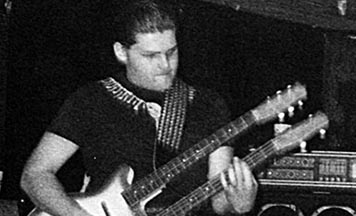
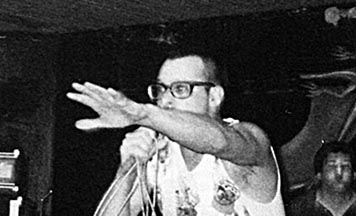
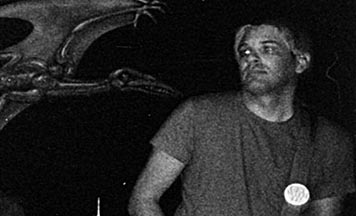
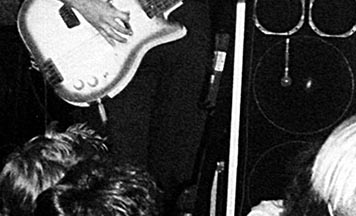
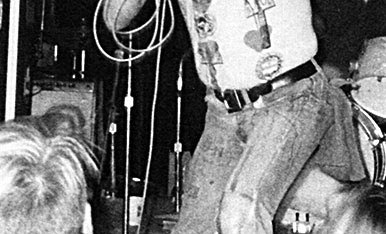
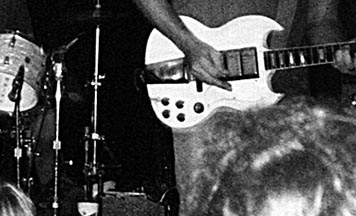
Brutal. “That was Brutal”. “They are Brutal”. When it comes to music I hear these terms bandied about constantly. It is exhausting. Whenever I've actually found myself in front of one of these ‘Brutal' bands inevitably all I see are children at play; over stylised junk riffs and genre-specific grimaces pulled by well fed pups who look like they haven't suffered a day in their lives, no matter how much they might deserve to.
Brutality can only be understood by experience, and those experiences can be diverse. Maybe a life of steady disappointment littered with snatches of triumph so small as to be almost unperceivable? Scattered pyrrhic victories that glow dimly in a constellation of failure. I don't know.
Framing those experiences musically so they convey both the crushing, monolithic weight and the tiny subtleties takes an understanding of structure and a healthy disregard for it. And being able to articulate those depths emotionally as anything other than a hollow screeching 'woe is me' takes a keener mind and bigger britches than I can boast. Humour, but humour to attack and not distract. Humour as the only weapon available to you. And let's not forget a healthy does of pathos. A human life as human as you could ever dare to be.
STICK MEN WITH RAY GUNS (hereafter SMWRG) understood brutality and they have what it takes to make you understand it, if you can bring yourself to listen. Most didn't and continue not to. In part this is down to the music itself which has a scabrous edge barely dulled by the 30 years of successively louder noises we've been bludgeoned with since they first stood up and walked. But there is a practical factor — the absolute dearth of recorded material available in their life time assured that they would never be anything other than a rumour outside of their native Texas. This was corrected in 2002 by Emperor Jones (an offshoot of Trance Syndicate) who issued the Some People Deserve To Suffer compilation. Collecting the meagre number of studio tracks with assorted live recordings it gives a snapshot of a band that never made the defining recorded statement they were clearly capable of. To be left with these distant echoes is eternally frustrating, but it is a testament to the power of the initial blast that those echoes ring so loud.
The band was Clarke Blacker on guitar, Bob Beeman on bass (dig that alliteration), Scott Elam on drums and Bobby Soxx on vocals.I interviewed Clarke Blacker by email in 2008 and then sat on it for 5 years, because that is what I do. Thanks to Clarke for his patience and Rob for his indulgence.
This one is for all you immortal motherfuckers!
PS: Could you share a little bit of your personal background? What is your earliest memory of music, and can you see anyways in which it influenced what you came to do with SMWRG?
Clarke Blacker: My background is just a typical '50s middle-class USA upbringing. I may be a bit older than many in the movement. I was an old man of about 25 when I first got involved with the new music movement in 1975-1976.
My first real memories of popular music are actually of watching the chaotic scenes of Jerry Lee Lewis wrecking his piano on the Ed Sullivan variety TV show sometime in the late ‘50's. I didn't start really listening actively though until about 1960-61 when I was around ten or eleven. This was near the height of Top 40 Radio's influence and I went to sleep every night listening to the local radio stations. Dallas station KLIF's owner Gordon McLendon is often credited with inventing the top 40 radio format and the Dallas radio market was very powerful. During these years, the top 40 stations always alternated playing new singles with older music on the weekends. This was to become very influential to me.
Pretty soon the BEATLES and the British Invasion came along changed everything.
I was listening to Fats Domino, Chuck Berry, and Etta James at the same time as I was listening to the YARDBIRDS, the BEATLES, and the ROLLING STONES. As a result, I've never recognized any real differences in rock music. I see no difference between Ike Turner, VELVET UNDERGROUND, and PIL. You might say my tastes are very eclectic.
By 1965 every boy my age (15) wanted to play guitar. Nearly every one got one. Some continued playing and some didn't. I loved being on stage but like almost every guy my age I was really only interested in two things, girls and guitars. Cars were only there to help you get girls or move guitars and amps around. I bounced around the local rock scene on and off for years but I was neither especially motivated or even very talented. I eventually got bored with mainstream rock and got sucked into the jazz-rock and art rock coming out of England and Europe. I have always been a big fan of KING CRIMSON but I also like GONG, SOFT MACHINE, BATTERED ORNAMENTS and other denizens of the Canterbury scene.
PS: Can you identify a specific event that helped you realize you could make music as oppose to just consume it? Where you galvanized by the post 77 climate or where you already on the path by then?
Clarke Blacker: In 1976 I was doing a critical history of modern rock (British Invasion onwards) show on a local radio station and through that show I became friends with Mike Haskins, another music fan. One day he suggested that I come to see his band play the next weekend. They were called the NERVERBREAKERS. They were playing in some small hard rock club in Dallas that I'd never been to. I showed up out of boredom one Friday night and I was completely blown away by the energy of it. They were very loud, very rough, and brilliant.
I had forgotten why I had started listening to rock music in the first place. It was really all about the visceral feeling that it gave you. I had been paying too much attention to the cerebral aspects and ignoring the emotional and physical qualities. I was stunned. I came back the next night and the next weekend to record them live for broadcast on the station.
I was blindsided by the new music scene, I hadn't been paying attention, but after my encounter with the NERVEBREAKERS I dove in quickly. Soon after those first shows their bass player left the band. Despite the fact that I was a guitar player, I offered to sit in on bass until they found another. I ended up staying for roughly a year or so. It was a very heady time. There was definitely something in the air.
They had been just playing around for a couple of years going nowhere, but I had no problem just calling people up and demanding they let us play. I'm just pushy I guess. As the scene started to come together, we started getting more visible, eventually opening for the RAMONES and eventually for the SEX PISTOLS. Meanwhile my marriage was complicating things and under tremendous personal pressure I quit the band about a week after the PISTOLS show. I eventually would return to help with management and later doing some artwork for them.
As my marriage was disintegrating so was the NERVEBREAKERS. Mike and Bob (the bass player who replaced me) finally bailed out and together we started a new band, BAG OF WIRE (BOW). It was a strange amalgam of rock, blues, rockabilly, ska, and anything else that interested us. Then we mixed some CAPTAIN BEEFHEART with it for just a bit more spice. Mixing a bunch of different styles in a blender approach is a favorite technique of mine.
BOW was started as a rock band that had no philosophy to push. We liked guitar oriented rock, we liked a lot of different things, and we didn't think there was anything incompatible about any of those different musical interests. We didn't see any reason why the punks shouldn't like it too. We had fun, we played loud, and were very popular with the girls. With three of the five of us going through divorces it didn't last very long.
PS: When did you first meet Bobby Soxx, and what was your initial impression of the man?
Clarke Blacker: Bobby had approached me one night while playing with BOW. Up to that time I had spoken to the Soxx maybe a few times, but that was about it. I liked him even if it was immediately apparent that he was crazy. He was good friends with Valerie Bowles (my future wife Vicky's sister) who had played bass in one version of the TEENAGE QUEERS. He approached me about starting a band at the BOW show at DJ's on what might have been Vicky and my first date. He was very sweet.
The Soxx was never violent with us. From the very beginning he was very professional, or at least as much as a crazy man can be. No matter what kind of substance abuse problems he may have had, he took the band very seriously. He was always there, he never missed a practice or a show. I can't say that about myself. He really tried hard to put on a good show no matter how impaired he was by anything. He was far easier to work with than many other people that I've known. He was easier to work with than I was.
PS: To what extent was the SMWRG approach and sound premeditated? Did it evolve organically over time? Both?
Clarke Blacker: Starting in the spring of 1981, it took only a few months for it to solidify, but it soon came together. The obnoxious cartoon Stick Man character just took over and we just pushed it as far as we could stand it. We constantly threatened to run Bobby down on stage. We were very aggressive, but in a non-violent sort of way.
SMWRG was an unintentional creation of the four guys that did it. It could have taken any number of shapes depending upon the personalities that might have been involved. It just happened the way it did because the Soxx was such a strong personality (OK, he was crazy) and we built on that. We just naturally seemed to sound that way. It was sometimes a parody of what we saw other bands doing, but it was just the chemistry between four guys who fed off each other's existing anti-authority sentiments.
Bob Beeman (bass) was mostly interested in annoying people as much and as loudly as possible. Growing up in the heyday of the guitar heroes (Beck, Clapton, Page, etc.), I just naturally assumed that the guitar player was more important than anyone else, so I played as loudly and as much as I wanted to. I wasn't stepping back for anyone. Scott worshipped Charlie Watts and the painter Jasper Johns. He had as bad an attitude as the rest of us, all the while looking like a guy you met at the office.
We evolved into a pretty big heavy machine live after a couple of years. By 1983-84 we sounded pretty good live. We settled down nicely with our trademark slow grinding shows. They generally had elements of chaos, not exactly violence, but general disorder usually in directly reverse proportion to the size of the clubs. The smaller the club, the more things tended to get nuts. Often the more comfortable we were, the more unpredictable the show was, but if we were bugged about something then things could get really weird very fast.
Essentially, we thought Bobby was very funny and so we egged him on, whether he was taunting the audience, going on long rambling rants that could offend anyone within earshot, removing articles of clothing for some unknown crazed obscene purpose, or whatever.
PS: Did you have any creative ambition for the band other than as a vehicle for ‘rocking out'?
Clarke Blacker: We had no ambition at all. It was really liberating. We never gave even one minutes thought to being popular and so we did exactly what we thought was interesting or what was funny.
PS: Do you have any strong recollections of the first live show? Was it a success? Did it teach you anything, individually or collectively?
Clarke Blacker: It sounded like crap but it still seemed to show promise right away, at least to us. I liked the fact that we were doing something pretty off the wall and getting away with it. It was sort of the anti-punk punk rock band. What was more punk than that?
PS: For me, sonically speaking, SMWRG were totally unique for the time. The recordings show a level of sonic violence unprecedented in the States. What kind of equipment did you use to achieve this? Was it a haphazard collection of whatever you could lay your hands on, the result being a product of some providence? Or was everything carefully chosen to meet a particular end? On a personal note, how the hell did you get that bass sound? The strafing feedback on ‘Kill The Innocent' (digital delay manipulation?) and the bass on ‘Buttfuckers' and ‘Christian Rat Attack' are all particularly inspiring.collectively?
Clarke Blacker: When we started to develop the SMWRG sound we wanted to overwhelm the audience with sound. Sometimes it really worked, sometimes it didn't. I was looking for the ultimate aggressive sound. I wanted to melt the audience's ears. It seemed the appropriate thing to do. Our sound is just the three of us (plus Bobby) turned up really loud.
Bob Beeman used a number of different basses. He had at least one Guild, a white Gibson Thunderbird that was really pretty, and a double-neck Danelectro for a while. He used a number of different bass amps over the first year or two, mainly Fenders I think. He eventually bought the biggest Peavey that I had ever seen with two 18" and two 10" speakers. It had everything from the lowest bass to highs that made your head ache. Since Bob was really into irritating people, he just kept playing louder until it was way beyond bass guitar as you know it.
It really pains me that the CD and nearly all of the rest of our recordings don't really convey the excruciatingly loud bass. The only places where you get any hint of it is in the live tracks ‘Scavenger of Death', ‘Kill the Innocent', and maybe also on the studio cuts ‘Christian Rat Attack' and ‘Grave City'. It's simply not realistically possible to turn your stereo up loud enough to move the amount of air to reproduce it. ‘Kill the Innocent' is mainly just Bob's bass amp turned all the way up and him flailing away at it. No other effects were needed.
In the beginning I used a 1961 Gibson Les Paul Custom guitar (the white SG style) that I had traded another guitar for in 1970 while I was in college. It was slightly damaged (the cable plug) at a show in Houston in 1984 and I went right out the next week and bought a 1976 black Les Paul Standard to use on stage. I wanted a guitar that I didn't care about and could replace at a moment's notice if necessary. It sounded very good and I liked it quite a lot, but it was unbelievably heavy. I still have it.
I only used the Les Paul Custom from that point on when I felt comfortable that I could protect it from the rowdy audiences. I eventually sold it in 2005 to some collectors who were going to fully restore it. I had owned it for 35 years and it seemed that it was time to let it go. For slide I used an electric National Resonator guitar that Bob Beeman owned. It was very unusual. It looked a bit like a Gibson ES-335 with these big chrome resonating plates all over the front.
I used primarily echo and a fuzz for a bit more punch. I also used an old Maestro Echoplex tape loop echo for a while in the very beginning until it finally died. I replaced it with a Roland DC-20 Analog Echo and added an early rack-mounted Korg SDD-2000 Sampling Digital Delay soon after. I mostly used an old Boss Distortion box I got from Bob and sometimes added an ancient Cry Baby Wah Wah pedal dating from the late 60's. I also used a really old late 60's Univox fuzz that had a two-position tone switch in the very beginning but it eventually broke. It could sound like breaking glass. I've never seen another like it. I also used some other stuff like that from time to time that I had acquired when I was about 18. I also used a Jordon Bosstone fuzz from about 1967 a few times. The Soxx had picked it up somewhere, they are very rare. It had an incredible sustain circuit built right in, you could hold a note forever. It got stolen in Houston.
I used my 1961 Fender Concert amp almost exclusively, but I did use one of Bob's Fender Bassman heads for a while when the Concert was feeling ill (cold solder joints). I like Fender amps a lot, a whole lot. I used a very nice mid-80s Fender Super Twin amp (I think that was the name) once at the Ritz Theater in Austin when the fuse holder cap on my Concert turned up missing just as we went on stage. The amp belonged to the guitarist for the opening act (I can't remember who) and I liked it a lot too. It eventually turned out that the fuse holder had actually broken off during transport. Imagine that, after only 25 years, cheap American equipment.
I eventually was overdriving front end of the Concert so much that I was only running the amp on between 3 and 4. The gain was all in the effects setup before the input on the Fender. As a result, I had to replace the four 10" speakers with two JBL 12"s because I couldn't keep the 10"s running for more than a show or two. We were always the loudest band at a show, no matter what equipment the other bands brought.
PS: At the time did you hold any particular musicians as key influences in your own playing style?
Clarke Blacker: I was always influenced by Robert Fripp but I wasn't a good enough guitarist for that to show very much. I was also heavily influenced by the guitarist in seventies touring bands of Iggy Pop, Ivan Kral and others. He used a number of different guitarists on tour, but they pretty much all used the same basic approach. Loud, heavy, very tasty. I really wanted to eventually play with his band. It wasn't really a goal, just something that I had in the back of my mind.
I came to especially admire Keith Levene with PIL. That must be pretty obvious. Still, Robert Fripp is my favorite guitarist. I tried to use that when I could.
PS: How often did the band practice? Did you focus on practicing your existing repertoire or was the focus mainly on writing new stuff?
Clarke Blacker: We didn't practice too much, usually only once a week. We might practice a song or two to get warmed up, but we just as often would be fooling around with some Iggy song like Dum Dum Boys. We mainly spent our time with new material.
PS: What was the writing process like? Was it usually initiated by an individual member, or did it come out of jamming?
Clarke Blacker: Mostly we just started improvising until something started to work. Bobby would bring out some lyrics that he had written and we'd see if we could make it work together. Actually, now that I think of it, this process was essentially simultaneous. While we were improvising Bobby would rifle through the briefcase that he always carried (full of lyrics and porn magazines) until he located something that he could make fit. Sometimes it started with the lyrics, sometimes the music.
For example: ‘Christian Rat Attack' (CRA) is actually an old TEENAGE QUEERS song with completely new music. We were in the studio in San Antonio, Texas to record a song for the Cottage Cheese on the Lips of Death compilation album. At the very last minute we decided not to do the song that we had originally planned (no, I don't remember which one) and Bob Beeman suggested that we write a new one there and then. The Soxx suggested the lyrics to CRA and we just put the music together that morning and, with the help of BUTTHOLE SURFER Gibby Haynes acting as engineer, we recorded it in just a few hours.
PS: How big a role did improvisation play in the band?
Clarke Blacker: Primarily in rehearsal, as a writing technique.
PS: I noticed on your website a list of songs covered by SMWRG. Amongst a healthy selection of STOOGES tunes there is ‘Earthworm' by FLIPPER. FLIPPER are one of the bands that people seem keen to put in the same bracket as SMWRG, a comparison that always struck me as pretty superficial. How did you become aware of them? Did they hold any particular influence over your own approach? Did you ever play with them?
Clarke Blacker: We played STOOGES songs almost exclusively as covers, not really by design, but because eventually that was all we felt like playing that we didn't write. Live, SMWRG virtually owned ‘TV Eye'. I heard a FLIPPER tape at one of the very first rehearsals when someone suggested ‘Earthworm'. We played it a few times live but I can't say I ever heard another FLIPPER record. We're often compared with them but it wasn't intentional. The comparisons always seem to be favorable. That's good, but it wasn't anything planned. I'm ashamed to say that I've only heard one FLIPPER tape and that was once in the first few weeks when we were first putting the band together. Considering the comparisons, I really should be more familiar with them. I do take it as a compliment though.
PS: Did you ever feel like you had any real peers locally, nationally or internationally? Or was the feeling very much one of being out on your own, aesthetically not geographically.
Clarke Blacker: No. We never paid any attention to what other bands were doing, other than to listen to whatever we liked. We just never thought about it. I guess that you could say that we felt we were aesthetically on our own.
PS: Beyond a few compilation tracks you never released any records in the bands life time. You've hinted in the liners to Some People… that you had difficulty capturing the bands sound in the studio. Can this be attributed to anything in particular, with hindsight?
Clarke Blacker: Too little money, too little studio time spent. Engineers balked whenever we started to get set up and going. The levels completely freaked them out. Gibby was the only engineer who didn't have any problems with it and it shows. CRA could have been even better if we'd had time to work on it more. I was enjoying working on all the guitar parts (maybe 5 of the 16 tracks, I think) and getting the production right but we only had a few hours (maybe four or five), I can't remember exactly how long it took. Most of the final 16 tracks were recorded in only one or two takes. We just didn't spend very much time on it.
PS: Am I right in saying you never played outside of Texas? Or if you did, it was only rarely? Why was that?
Clarke Blacker: No one asked us to that I remember. We couldn't have stood being together long enough to get somewhere out of Texas (Texas is a very big place compared to England). Beyond Austin, San Antonio, and Houston, the closest decent sized city was New Orleans, Louisiana, and it was 500 miles away from Dallas. We like to keep it within about a 200-400 mile radius. That way, we were still speaking on the way home from the show.
PS: Traditionally, bands maintain momentum through a cycle of releasing records and touring. As you never took this root, what drove the band to continue over so many years?
Clarke Blacker: It was still fun. We took a break during 1987 for each of us to do other things. We had started to get bored with it. We came back together in early 1988 but our hearts weren't really in it. Bobby had become hopelessly addicted to alcohol and there was less and less of him there. I remember sitting in my van in Houston before a show with Bob Beeman and Scott and saying that we couldn't do this any more. Bobby was simply too far gone. We had flown him down for the show because no one wanted to ride in a car with him for five or six hours each way.
PS: Can you recall how you felt at the end of the last SMWRG show? Were you even aware that it was the last show?
Clarke Blacker: The last show was in a local club for something called the Change Your Life Festival. What a ridiculous name. Why on earth would they want us to play for something with a name like that? It was some kind of multi-venue, multi-day event set up by some hippies. I never understood it, I couldn't figure out what it was all about. The scene was changing, and not for the better. In Dallas, there were bands like EDIE BRICKELL and the NEW BOHEMIANS starting up. It was turning into what would eventually become the alternative rock scene. Awful, awful stuff.
I was moving to Florida very soon and I did know it was the last show. I was glad it was over. It didn't end on a high note. I have some video that Bobby's girlfriend Nancy took. I'll try to make this available soon I hope in some form or another.
PS: When you look back on the bands life, what is your one major regret?
Clarke Blacker: I'm sorry that we never spent enough time in the studio to get it really correct and that there aren't more decent quality live audio recordings available.
PS: And what do you feel was the bands greatest moment?
Clarke Blacker: I'm rather fond of the fact that after playing the Rock Against Reagan Tour Houston, Texas show (Ed. Note: The Roack Against Reagan - Live in Houston April 6, 1984 album was released for digital distribution in 2014 and is currently available worldwide.) to a very big response, the hippies that ran the tour did an about face and decided that we were actually really Satan incarnate a few weeks later. They then dropped us from the bill for the tour finale scheduled during the Republican Convention during the summer of 1984 in Dallas. So, in true Stick Men fashion, we called up the Reagan Re-election Campaign and arranged to play a Rock For Reagan show when they held their national convention in Dallas a few months later. The Republican's gave us all sorts of campaign paraphernalia and banners. If any Republican representatives ever came to the show as promised they clearly didn't stay.
PS: Are we to take Some People Deserve To Suffer as the definitive recorded statement by SMWRG, or is there more to come?
Clarke Blacker: There's nothing of better sound quality out there. The recording from the Live at the Hot Klub session that yielded ‘Kill the Innocent' and ‘Scavenger of Death' is unusable. The tape came apart. King Coffey was trying to get it fixed but the last I heard his efforts were not successful. A couple of years ago Paul Leary wanted to take another stab at it as well, but I never heard anything positive regarding any efforts that he may have made at resurrecting the tape.
I'd like to make the many hours of third-rate poor quality live recordings available for download in some way. I haven't figured out the best way to make it available cheaply as yet but I will eventually. I probably have thirty of forty shows, quality ranging from bad to awful.
PS: One of my favourite tracks on Some People… is ‘Buttfuckers (Try To Run My Life)'. That track has got such an amazing swagger and the vocals are so busted (due to illness, I understand) the intro rant sounds like its being played at the wrong speed. You mentioned in the liners that the song was taken from a proposed live album with the BUTTHOLE SURFERS that got canned due to the aforementioned illness. Are the tapes for that lost now?
Clarke Blacker: It's interesting that you'd like that track. For me it was a real lost gem. I had never actually liked the song much and had actually forgotten about it before I started to put the CD together. I didn't have anything against it but it just wasn't what I thought we did best, and the lyrics were a complete throwaway based solely on a few lines in a live STOOGES track. The night we recorded with the SURFERS, Bobby turned up at the show sounding exactly as you hear him in the introduction. It was absolutely ad-libbed, Bobby was probably really having landlord troubles at the time.
I had completely written the show off. It was maybe ten years later when Paul Leary sent us a good copy of the tape that I rediscovered ‘Buttfuckers'. It really blew me away. Even without the crazy introduction it comes across as the archetypal heavy metal song. We had originally intended it to sound that way when we wrote it, but before that show it never really seemed to work.
It is so heavy and so stupid, it bludgeons the audience into submission. I really like it. It isn't art but it is great.
PS: Are any of the surviving SMWRG still involved in music?
Clarke Blacker: Not that I know of. When I moved to Florida in 1988 there wasn't anything going on worth listening to and I haven't been impressed with much that I have heard since then.
PS: Are there any contemporary bands you are currently following?
Clarke Blacker: I like SOCIAL DISTORTION quite a lot, but other than them, not really anyone. I did like MY BLOODY VALENTINE also but that was some time ago. My wife and I saw X just a few weeks ago and they still sound exactly like they did when we opened for them roughly 25 years ago. Deafeningly loud, older and rougher looking, but still great. Nothing really strikes my fancy, but I'm sure there are people doing music worth listening to out there somewhere.
THE END
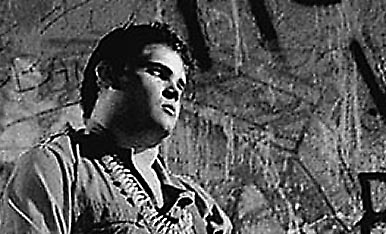
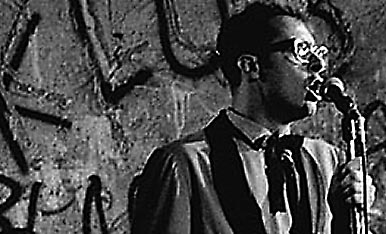
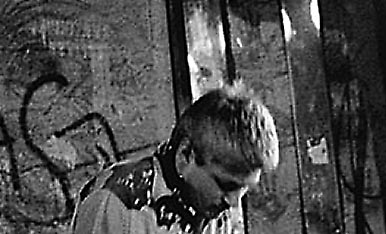
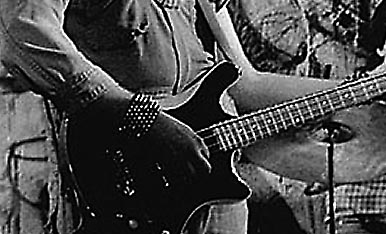
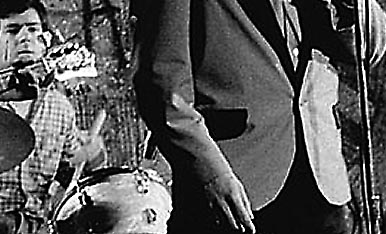
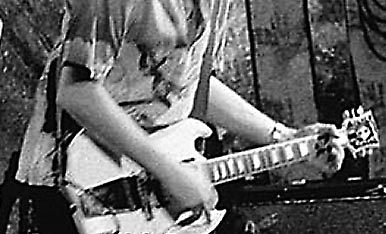
Fearless Iranians: How did you first start playing bass?
Bobby Beeman: I had been messing around with guitar, but it just wasn't clicking. Then I picked up a friend's bass one day and knew right off that was what I was meant to hold.
Fearless Iranians: Influences?
Bobby Beeman: There's lots, just tons. I started combing used record stores, pawn shops, yard sales, etc. as soon as I could ride a bike to the store. My first big influence was Elton John. I mean the early stuff. One day my mother told me I could never listen to a band called Black Sabbath, because they were evil. Later that day, I bought my first Sabbath album, Sabbath Bloody Sabbath. They made a huge impact. Rock Scene magazine wrote about the NY Dolls and I found Too Much Too Soon in a cutout bin. I saw this cartoon in Creem magazine about Raw Power (Iggy) and in the cartoon, these old burned out hippies listened to it and were rendered speechless and immobile. I finally tracked it down and listened to it all the time. I was on the search for anything that made me feel like Sabbath or the Dolls or the Stooges did, but I also listened to movie soundtracks, Martin Denny, Buddy Holly, Bob Wills, The Ventures, etc.
Fearless Iranians: Any previous bands?
Bobby Beeman: The first time I played on stage, it was with Bobby, before Stick Men in a band called The Enemy. My first gig was opening up for Black Flag in Ft Worth, Tx in front of about 20 people. Dez was their singer, this was Dec 1980. A couple of Stick Men songs came from that band, Enemy Enemy and Two Fists.
Fearless Iranians: How did you first discover punk rock?
Bobby Beeman: There wasn't an "aha" moment. I had been listening to The Stooges, and then the Ramones, etc. As new stuff was released, new bands came around, I just listened to their stuff.
Fearless Iranians: How did you come about meeting the other members?
Bobby Beeman: Stick Men's first show, I was playing in a band called Hole (after The Enemy and before Stick Men, and well before Courtney Love) and we opened up for Stick Men at their first show. They had a fill in bass player at the time, and after the show, Bobby Soxx asked me to join Stick Men, so I did. Same club we had opened for Black Flag, Zero's. Hole was kind of a noise/industrial band. We ran everyone off before Stick Men played, and they were mad, hahaha.
Fearless Iranians: What was the first time you met Bobby?
Bobby Beeman: It was at a bar called DJ's. I was 16 at the time, and the drinking age in Texas was 18. Things weren't like they are now though, we had fake ID's that worked, and many places were kinda lax about it. Bobby was in the Teenage Queers then. I told him that he reminded me of a singer in a band called Crass. If you listen to the Stick Men stuff, you won't hear it, but some of his Teenage Queers stuff sounded a lot like some of the first Crass album. Anyway, he told me he would kick my ass if he didn't agree, but I played it for him and he did, so ass was not kicked.
Fearless Iranians: What was the Texas scene like back then?
Bobby Beeman: It was very small. This club, DJ's... it was a stretch to get 50 or 60 people in there, and rarely did that happen. We went to the club, and then partied afterward. There weren't a lot of us, so we all knew each other. By the time Stick Men started, DJ's was closed and the scene was slightly larger, but not much.
Fearless Iranians: What was the history of the band exactly?
Bobby Beeman: Well, I talked about the early history. We played almost every weekend for 6 years. Dallas, Austin, Houston, and a few other places in Texas. We didn't rehearse much. If we went out of town, we would usually take 2 or 3 vehicles because we really didn't get along well and sometimes hated each other. Toward the end, Bobby was falling pretty far into his various addictions. He had always been dependable for band stuff. This guy who barely held it together for the most part, was always there for the band, so that really made it work. If he had been a flake, it would not have lasted. I mean, one time I went to pick him up for a Houston show, and he was asleep. He got up, and started getting stuff together for the trip. He put on some jeans, found some shoes, slung a shirt over his shoulder. Then he got a machete, a foot long sharpening stone, and a 2' ice pick with a leather sheath he had made for it. He looked up and said "OK, ready to go", and off we went.
Fearless Iranians: Why did you break up?
Bobby Beeman: It was just... over. We had a show, opening for the Surfers, it was the last one. Soxx was too messed up to go on much longer. We decided to stop. Then a year later, we got back together for a couple of shows. After that, I moved to Seattle, Clarke moved to Florida, Scott moved to NYC, and Soxx went to prison.
Fearless Iranians: What are you up to these days? Do you still play?
Bobby Beeman: I played in a band called Graceland after Stick Men broke up the first time, and until not long before I moved to Seattle. We have recently played a couple shows. We have another one coming up in July. I'm also working on an industrial project. When I say "industrial" people think of Ministry or NIN (or worse), but it's nothing like that at all. I don't think of dance music when I use the word "industrial".
We realized early-on that we would never go on a tour, we would never get a recording contract, etc. Bobby was fine once or twice a week, but the idea of all 4 of us spending any extended time together was not going to work. With that in mind, we were pretty free to amuse ourselves as we saw fit. I always looked at is as we were on stage playing to manipulate the audience as we watched them. We were not the entertainers, they were. We were the catalyst. The notion of doing something because the audience would like it wasn't a thought. Sometimes, doing things so the club would let us play again was, but that's about the extent of our "commercial" aspirations. We were too hard and too wild for Dallas, which mostly leaned more towards pop music. Austin was a good audience, but we were kicked out of Austin a lot by clubowners. Houston seemed a good fit, but it was farther away. You could get to Austin in 3 hours, but Houston was 4.5 or 5 hours. Big difference in getting off work and making it in time for the show, or driving back after we finish. Stick Men were never terribly popular. We have more fans now than we did when we were playing, by far. Mostly, people were scared of us, is what I've heard in years since.
Fearless Iranians: What can you tell me about Bobby Calverly's upbringing? What was he like in high school? His family? Did he have any brothers or sisters?
Bobby Beeman: I don't know a lot about his early years. I think he was pretty poor for a while, but then his dad started making money, and he had a middle class home, etc. for a while before he moved off. He didn't get on well with his family. There was one point he got a job in his father's print shop, and I picked him up from work there. It was a big place, they were printing newspapers and stuff, had some big, new machines. That didn't last long. Some years before I met him, he had held his grandparents hostage and had a standoff with the police. This landed him in the insane asylum for a while. The cover of the Bobby Soxx 45 is a self portrait, when he was in the hospital after having been stabbed in the lung. I don't remember why he said he had been stabbed. This was all before I knew him. Some of his relatives turned out for his wake. They were pretty tight lipped.
Any great stories your willing to come forth with, I would love (and everyone else who reads this i'm sure) to hear. Anything and everything. Fights with other bands, members of the audience... anything.
Fearless Iranians:
Bobby Beeman: There are so many of those. Everybody who knew Bobby Soxx has stories to tell. There was a lot of negative stuff for sure. There was also a lot of positive. He could be kind, loyal, he'd give you the shirt off his back, even if it was his last shirt. Bobby had a lot of friends, and that was because he was a good friend to many. Of course, he had his share of enemies as well. Bobby had the Ying/Yang thing down, and he was full tilt both ways. I will tell you some more stories in a while.
Fearless Iranians: What jail time did he serve and what for?
Bobby Beeman: He went to prison, I'm not sure of the final charges he was convicted of, but it was in the range of attempted murder/assault. He beat his girlfriend nearly to death. Her name was Candy, and she's no longer alive either. I saw Candy at his wake. Candy was someone I had known for years, but she wasn't part of the punk rock scene at all. She and her husband at the time came to Stick Men shows a few times, mostly because she and her husband were friends with Clarke and I. After she and her husband split up, she turned up with Bobby Soxx. We all warned her that he beat women. Hell, he sang about it.
Candy was very smart, and she knew what she was getting into with him. What Bobby did was inexcusable, but I feel like Candy had some need to punish herself and goaded him into it. Of course, there was a lot of alcohol and drugs involved. She told me at his wake that she knew. Soxx was out of control and they both got what they needed out of it, I think... as strange and fucked up as that sounds. Bobby and Candy were both working for a mobile catering (roach coach) business. I think the assault happened on a weekend. He beat her and then smashed her head in the toilet bowl until there was blood all over the place and she was unconscious. By Monday, both were at work and according to Candy, when he saw her, he said "I thought I killed you, I left you for dead." Her description of it was that it was said with hate, not remorse. I was in Seattle by then, and only heard about it secondhand at the time. I didn't talk to Candy until the wake. I should also mention, her death had nothing to do with Bobby Soxx.
Fearless Iranians: Did you keep in contact with him after the band? What about up until the day he died? Other members as well?
Bobby Beeman: He called me once after he got out of prison. He was in for 5 years or so. When he came out, everything was "Holmes" this and "Holmes" that He said there were basically 3 groups in prison, the white Aryan guys, the Mexicans, and the Blacks. Bobby said he hung with the Mexicans. He said the white guys couldn't be trusted. In Seattle, I had a business, a wife, and a son. I didn't go looking for Soxx or make efforts to stay in touch, but then I was easier to find than he was and he knew how to get ahold of me. Nobody from the band was in touch with him. We heard he was homeless at one point, and Clarke started looking for him via the website. We were all as far removed, geographically, as you could get. Scott and Clarke haven't spoken in years. Scott refuses to talk to him. I've been in touch with both of them, off and on.
Last Summer, Clarke and I played a reunion show for DJ's. Clarke was going to be in town for something unrelated, and at that point I had literally not picked up a bass in 15 years, or played live in over 20. Clarke brought some of Bobby's ashes and we had a big picture of him at the back of the stage. The drummer was Russell Fleming, who played with Clarke in Bag O Wire and had previously been the drummer for the Vomit Pigs and many others. Russell is now the drummer for Graceland. I made some copies of lyrics and passed them out, and anyone who wanted to sing was invited to get up and sing. We played 3 or 4 songs, and it was terrible, but it was fun. I started playing music again after that. Funny thing though, Scott called me out of the blue the week of that show, and I told him about it. He had no idea. In a way, he was there too.
Fearless Iranians: What was the deal with the original Bobby Soxx 7inch? And who played on it. What was the response back then for it?'
Bobby Beeman: I'm still a little fuzzy on who actually played on that. The Teenage Queers had a bunch of different members, but the core of it was Steve Dirkx from the Telefones (who wrote or co-wrote most of the Queers songs) and I know Steve was involved. I've heard that Neal Caldwell or Randy from NCM played on it, but not sure. Jerry Dirkx was probably in there. I never really asked, to tell the truth. Neal and I split the pressing costs, and each took 250 of the 500 we made. They were hard to sell. I put them on consignment in various stores around Texas. Inner Sanctum in Austin sold some and then changed owners. They wouldn't pay me for what had been sold already, but they did give the 10 or so they still had back. I sold those a while back, and still have one left. Teenage Queers were kind of a pop/punk band. Other members included Valerie Bowles and Kim Wolfe. Valerie is the sister of Clarke's wife, Vicky.
Fearless Iranians: Tell me about any Texas Hardcore that you liked in general. What outside of Texas punk rock/hardcore bands did you enjoy?
CBobby Beeman: From Houston, there were Legionaire's Disease, Verbal Abuse, Really Red, Culturecide, The Mydolls, Pain Teens. Austin and San Antonio were the home of Butthole Surfers, The Dicks, The Offenders, Big Boys, Sharon Tate's Baby, The Huns, ReVersible Cords, Hickoids, Marching Plague, Bang Gang, Crust, Poison 13, The Norvells, Radio Fre Europe, Miracle Room, etc. Dallas/Ft Worth was the home of Vomit Pigs, Skuds, Superman's Girlfriend, Infants, Dot Vaeth Group, Nervebreakers, Mel Coolies, Peyote Cowboys, Loco Gringos, Hugh Beaumont Experience, Quad Pi, Lithium Xmas, Rev Horton Heat, Tex & the Saddle Tramps, Deprogrammer, NCM... I'm sure I'm forgetting some obvious ones too.
That's a very long list, but at the top I'd have to say Flipper, The Germs, Middle Class, Flesh Eaters, Sex Pistols, Dead Boys, pre-Rollins Black Flag, Circle Jerks, Dickies, Fear, The Fall, Fuck-Ups, Killdozer, Meatmen, Mentors, Misfits, NOTA, Poison Idea, Ramones, Television, Heartbreakers, X, X-Ray Spex, Adverts, Drones, The Subhumans (Canada, not UK), DOA, Pagans to name a few.
Fearless Iranians: What was Bobby's musical influence. I read once that he loved to blast Flipper's SEX BOMB at a local club. (makes a whole lot of fuckin sense ha!)
Bobby Beeman: I went to SF to see the Throbbing Gristle/Flipper show not long before joining Stick Men, and saw Flipper a few other times when I was out there. I came back touting Flipper pretty hard, and Bobby liked them. He listened to everything from ZZ Top and Thin Lizzy to Skrewdriver and the UK Subs. We all loved the Stooges. Bobby's first time on a stage was for a Robert Gordon lookalike contest a local radio station held. He won.
Fearless Iranians: What kind of jobs did the band work back then? Bobby Beeman: Clarke did graphics, Scott ran a commercial drapery business that his father had left him (that's where we rehearsed) and I was an office manager. Besides Bobby, the rest of us had steady work and reasonably stable lives.
Fearless Iranians: What did Bobby Soxx have tattooed?
Bobby Beeman: He had one old tattoo on his right arm/bicep. It was not well done and he had been stabbed in it, so it was hard to tell what it was. I think he had picked it off the wall at some old school tattoo shop at some point along the way. Tattoos weren't a big deal back then.
Fearless Iranians: What is the deal with the news broadcast about the band?
Bobby Beeman: Bobby appeared in an issue of "D" Magazine, which usually deals with socialite parties and restaurant reviews. He was one of 4 "interesting people" they profiled in that issue, and he shared the cover with the others. Not sure exactly how that came about. The news story came in the wake of that. Over 6 minutes of airtime, that's almost inconceivable these days... I think our manager at the time, Curtis Hawkins, had a hand in that. Curtis is the singer for Bag O'Wire and now lives in Nashville and works for Joan Jett's Blackheart Records. At the time he had a used record store around the corner from the garage apartment where Bobby lived, called Stacks O'Tracks.
Fearless Iranians: What about "COTTAGE CHEESE FROM THE LIPS OF DEATH"?
Bobby Beeman: That was something Gibby put together. He wanted us on it, and he was in San Antonio at the time, working with this guy who had a small studio called BOSS. We went down there to record for it. We stayed out on this old, inactive dude ranch that a friend of Clarke's owned. The night before we recorded it, Iggy Pop played at this huge gay bar around the corner from the Alamo, and we all went. Christian Rat Attack had been a Teenage Queers song, but the music was too "pop" for us. I started playing with it in the studio and Bobby put the Christian Rat Attack lyrics with it and the song was born about 10 minutes before we recorded it.
Fearless Iranians: Tell me anything about BUTTHOLE SURFERS and your experience with the band.
Bobby Beeman: We played with those guys a lot. In the beginning, they opened for us, but that switched around pretty fast. The photo that turns up a lot of Bobby with the microphone up his ass and the audience reaction, with Gibby realizing he was going to have to sing through it in a bit... that came after we started opening for them. The most memorable shows I think were the first and the last. The first was at a dance studio in Austin called Studio 29. It was in a neighborhood and music had to end at midnight. The Surfers played, and then we were supposed to go on.
The Stains (who later changed their name to MDC) wanted to play a few songs, and they talked to Gibby, who pleaded their case to us. We had to get our set done, but said the could play 2 songs. The 3rd song started up and we were starting to get annoyed. By the 5th song, Soxx was standing at the front of the stage screaming at David, who was taunting him. Bobby whipped his pecker out and started pissing on him. A melee broke out and we got onstage. I remember The Dicks, who were pretty close buds with The Stains (MDC) then, were fighting them to keep them off us. Earlier in the day, I found a roadkill cat and put it in a garbage bag behind my amp. The fight got out of control and I tossed the cat into the middle of it. About then the sound guy found out that Bobby had pissed on his monitor as well as on David Dicktor. The owner of the dance studio turned on the lights and threw everybody out. That was our last show at that club.
The last show was at Theater Gallery in Dallas. That club had vowed that we would never play there, before we ever had played there. The Surfers were going to play 2 nights and record a live album. The idea was that it would be a split, with Stick Men on one side and them on the other. The guy who recorded it screwed it all up. He didn't have enough tape to record Stick Men, and there was no way to get any by the time we knew. He ran a mix into a cassette, and some of that is on the CD. I saw Bobby earlier that day, but was worried about his state of mind, more than usual.
He lived in this apartment over a garage. He rented it for a long time. He was seriously messed up on meth and alcohol by then. All scabbed up and out of his mind. He had an axe just inside the door that was stuck on a rotating Xmas tree stand that played Silent Night. He had Bible verses glued to it. He said some guy/drug dealer came over to mess him up, and he had chopped the guy's ear off with the axe. His whole living room was full of bladed and sharpened weapons stuck in the wall. He called it the "Chop Shop". Over in the corner, there was a neon tube inside a glass 5gal water bottle that was hooked up to a power pack from an electric fence. It pulsated and he called it the "Wayne Brain". Bobby had taken to calling himself "Bobby Wayne" around then. He thought it was a good serial killer name.
That night, he showed up at the venue and his voice was blown out. It had been fine earlier. He could barely talk. The cuts off the CD where his voice sounds torn up were from that show. It's the only time he wasn't fully ready to go, but the band breaking up was something he wasn't happy about. He wasn't happy about much then, though. That was why we had to call it quits. That and the fact that the only places to play in Dallas at that time refused to book us. The thing is that most of our shows where things got way out of hand, were out of town gigs. The Dallas shows were usually pretty tame. The Surfers were in rare form that night. Many who were there list it as one of the most amazing shows they've ever seen. This was Jan, 1987. It was a contact trip, just walking in the place.






Lorem ipsum dolor sit amet, consectetur adipiscing elit. Sed interdum velit sit amet tellus auctor vehicula. Etiam vel sapien scelerisque mi auctor scelerisque vitae sed nisi. Vestibulum vel tempor massa. Etiam at odio aliquam enim condimentum faucibus vitae vitae risus. Nulla ornare, ante eu convallis congue, ipsum urna euismod arcu, id aliquam mi est non diam. Etiam facilisis accumsan diam fermentum tristique. Suspendisse sit amet mi nec tortor dignissim pretium. Proin ac faucibus nisl.
Maecenas eu eleifend dolor, ut feugiat enim. Ut bibendum eget sapien non posuere. Nunc sed ante non libero auctor ornare. Aenean id magna consequat, mattis sem et, porta augue. Maecenas dictum tortor ipsum, vel bibendum nulla egestas ac. Cras nisl eros, semper in auctor eget, convallis quis arcu.






Lorem ipsum dolor sit amet, consectetur adipiscing elit. Sed interdum velit sit amet tellus auctor vehicula. Etiam vel sapien scelerisque mi auctor scelerisque vitae sed nisi. Vestibulum vel tempor massa. Etiam at odio aliquam enim condimentum faucibus vitae vitae risus. Nulla ornare, ante eu convallis congue, ipsum urna euismod arcu, id aliquam mi est non diam. Etiam facilisis accumsan diam fermentum tristique. Suspendisse sit amet mi nec tortor dignissim pretium. Proin ac faucibus nisl.
Maecenas eu eleifend dolor, ut feugiat enim. Ut bibendum eget sapien non posuere. Nunc sed ante non libero auctor ornare. Aenean id magna consequat, mattis sem et, porta augue. Maecenas dictum tortor ipsum, vel bibendum nulla egestas ac. Cras nisl eros, semper in auctor eget, convallis quis arcu.